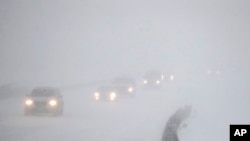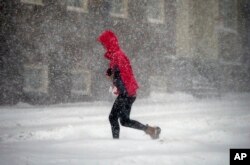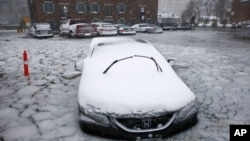New York City Mayor Bill de Blasio has told New Yorkers that the area is experiencing "blizzard-like conditions" and urged people to stay inside "if at all possible."
The city is under a winter storm warning, as a result of a system on the U.S. East Coast that meteorologists have dubbed a "bomb cyclone."
The storm brought as much as 20 centimeters (nearly 8 inches) of snow to some parts of New York City. Flights were suspended at both of the city's major airports, while nearby Newark, in New Jersey, was facing delays. Across the East Coast, thousands of flights have been disrupted.
The storm is having an impact from Florida to Maine, the most northeastern U.S. state.
Two people died in North Carolina when their vehicle ran off the road in snow that was not expected for that area. The North Carolina Highway Patrol said it has responded to 700 road collisions and 300 other service calls since the storm began.
Eastern Massachusetts and Rhode Island, both northeastern coastal states, were among the worst hit. With snow expected to come down as fast as 7 centimeters per hour at times, some areas could see up to 45 centimeters (nearly 18 inches).
On Thursday, more than 5,500 businesses and homes were reported to be without power in Provincetown, Massachusetts, at the tip of Cape Cod where hurricane-force winds were in play.
Eastern Canada is feeling the impact as well, with at least 85 flights canceled at Montreal's airport and cancellations at Halifax airport, farther east. Some 17,000 homes and businesses were without power in Nova Scotia.
Niagara Falls, the famous chain of waterfalls located on the border between the United States and Canada, is partially frozen due to record-breaking low temperatures.
The storm began late Wednesday and severe conditions are expected to continue at least through Friday morning.
WATCH: New York Battles Snow
Forecasters call it a bomb cyclone because of the sharp drop in atmospheric pressure in just 24 hours, creating strong winds.
Snow covered the ground in Tallahassee, Florida, for the first time in nearly 30 years Wednesday. Ice turned highways in Georgia and the Carolinas into dangerous skating rinks.
Those who did not listen to warnings to stay home found themselves stuck in a 97-kilometer-long traffic backup along Interstate 95 — a major East Coast highway. Emergency workers, not used to powerful winter weather, could not keep up with the numerous accidents and overturned cars.
Fierce cold also is gripping much of the country from the Midwest to the East, including the Deep South.
The high temperature in International Falls, Minnesota, on Wednesday was minus 19 degrees Celsius.
Forecasters say much of the country can expect another wave of dangerously cold weather later this week before temperatures moderate.










